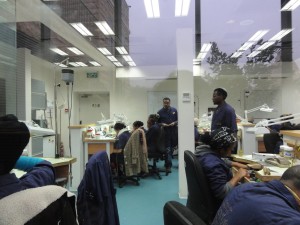Apart from pens, paper and a small recording device, there’s one other tool that you would be wise to carry with you wherever you go. I’m talking about a camera- a simple, digital point-and-shoot (aka PhD press-here-dummy) model that you can get today for around $100.
Even if you don’t intend to include photos with your article, they can serve as an illustrated notebook for preparing your article.

This photo for example helped me to remember and describe the Yvel jewelry workshop I visited. I only got an article assignment several months after my visit. But looking at the photo reminded me of the varied backgrounds the students came from and the different mother tongues. Now they all talk in faltering Hebrew together as their one common language. I remembered the warmth, both physical on the cold day and socially as indicated by their smiles. You can see theirhappiness at being taught a useful trade and a way of making a living and supporting their families.
But that isn’t the only way you’ll find that photographs come in useful.If you chance upon an interesting spot whilst on holiday and decide to write about it , you will amost certainly need photographs to accompany the article. You may or may not be paid extra for the photos, but without them there is no article.
If you write a profile of someone always take a few photos of them and their surroundings. Many publications don’t have the budget to send a photographer with you and will need a photo to illustrate the article. The photos will also remind you of the room/office in which you carried out the interview. You may not have noticed the paintings on the wall / the photo montage of his children / the types of book on the bookshelf ( you can zoom in and read the titles) all of which will help you ‘paint’ a broader picture of your subject.
.

Thanks for all your efforts and tips to ‘new’ writers trying to get more than just a foot in the door! It almost seems impossible to get articles published and frustrating when friends and relatives say, ” you wrote something again.” They have not the faintest notion of the effort involved and little if any remuneration. All this changes when I read your words of encouragement. Tizku L’MItzvos and wishing you much continued bracha!
Thank you so much for your comment and wishes Chaya. I’m always glad to help and encourage if I can. I still vividly remember the thrill and excitement of my first published article and the question in my mind whether I would ever be able to repeat it.